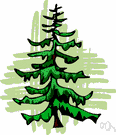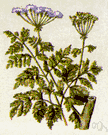hemlock
Also found in: Thesaurus, Medical, Encyclopedia, Wikipedia.
Related to hemlock: hemlock tree, Conium maculatum
hem·lock
(hĕm′lŏk′)n.
1.
a. Any of various coniferous evergreen trees of the genus Tsuga of North America and eastern Asia, having small cones and short flat leaves with two white bands underneath.
b. The wood of such trees, used as a source of lumber, wood pulp, and tannic acid.
2.
a. Any of several poisonous plants of the genera Conium and Cicuta of the parsley family, such as the poison hemlock.
b. A poison obtained from the poison hemlock.
[Middle English hemlok, poisonous hemlock, from Old English hymlice, hemlic.]
American Heritage® Dictionary of the English Language, Fifth Edition. Copyright © 2016 by Houghton Mifflin Harcourt Publishing Company. Published by Houghton Mifflin Harcourt Publishing Company. All rights reserved.
hemlock
(ˈhɛmˌlɒk)n
1. (Plants) an umbelliferous poisonous Eurasian plant, Conium maculatum, having finely divided leaves, spotted stems, and small white flowers. US name: poison hemlock See also water hemlock
2. (Plants) a poisonous drug derived from this plant
3. (Plants) Also called: hemlock spruce any coniferous tree of the genus Tsuga, of North America and E Asia, having short flat needles: family Pinaceae. See also western hemlock
4. (Plants) the wood of any of these trees, used for lumber and as a source of wood pulp
[Old English hymlic; perhaps related to hymele hop plant, Middle Low German homele, Old Norwegian humli, Old Slavonic chǔmelï]
Collins English Dictionary – Complete and Unabridged, 12th Edition 2014 © HarperCollins Publishers 1991, 1994, 1998, 2000, 2003, 2006, 2007, 2009, 2011, 2014
hem•lock
(ˈhɛmˌlɒk)n.
1. a poisonous plant, Conium maculatum, of the parsley family, having finely divided leaves and umbels of small white flowers.
2. a poisonous drink made from this plant.
3. any of various related plants, esp. of the genus Cicuta, as the water hemlock.
4. Also called hem′lock spruce′. any of several tall coniferous trees of the genus Tsuga, of the pine family, having short, blunt needles and small cones.
5. the soft, light wood of a hemlock tree, used in making paper and in construction.
[before 900; Middle English hemlok, humlok, Old English hymlic, hemlic; perhaps akin to Old English hymele hop plant]
Random House Kernerman Webster's College Dictionary, © 2010 K Dictionaries Ltd. Copyright 2005, 1997, 1991 by Random House, Inc. All rights reserved.
hem·lock
(hĕm′lŏk′)1. Any of various coniferous evergreen trees of North America and eastern Asia, having small cones and short, flat leaves with two white bands underneath.
2. Any of several poisonous European plants that have small, white flowers.
The American Heritage® Student Science Dictionary, Second Edition. Copyright © 2014 by Houghton Mifflin Harcourt Publishing Company. Published by Houghton Mifflin Harcourt Publishing Company. All rights reserved.
ThesaurusAntonymsRelated WordsSynonymsLegend:
Switch to new thesaurus
| Noun | 1. |  hemlock - poisonous drug derived from an Eurasian plant of the genus Conium; "Socrates refused to flee and died by drinking hemlock" hemlock - poisonous drug derived from an Eurasian plant of the genus Conium; "Socrates refused to flee and died by drinking hemlock"phytotoxin, plant toxin - any substance produced by plants that is similar in its properties to extracellular bacterial toxin |
| 2. |  hemlock - large branching biennial herb native to Eurasia and Africa and adventive in North America having large fernlike leaves and white flowers; usually found in damp habitats; all parts extremely poisonous hemlock - large branching biennial herb native to Eurasia and Africa and adventive in North America having large fernlike leaves and white flowers; usually found in damp habitats; all parts extremely poisonousConium, genus Conium - small genus of highly toxic biennials: hemlock poisonous plant - a plant that when touched or ingested in sufficient quantity can be harmful or fatal to an organism | |
| 3. | hemlock - soft coarse splintery wood of a hemlock tree especially the western hemlock hemlock tree, hemlock - an evergreen tree wood - the hard fibrous lignified substance under the bark of trees | |
| 4. |  hemlock - an evergreen tree hemlock - an evergreen tree genus Tsuga, Tsuga - hemlock; hemlock fir; hemlock spruce hemlock - soft coarse splintery wood of a hemlock tree especially the western hemlock Canadian hemlock, eastern hemlock, spruce pine, Tsuga canadensis - common forest tree of the eastern United States and Canada; used especially for pulpwood Carolina hemlock, Tsuga caroliniana - medium-sized evergreen of southeastern United States having spreading branches and widely diverging cone scales black hemlock, mountain hemlock, Tsuga mertensiana - large evergreen of western United States; wood much harder than Canadian hemlock Pacific hemlock, Tsuga heterophylla, west coast hemlock, western hemlock - tall evergreen of western North America; commercially important timber tree conifer, coniferous tree - any gymnospermous tree or shrub bearing cones |
Based on WordNet 3.0, Farlex clipart collection. © 2003-2012 Princeton University, Farlex Inc.
Translations
bolehlav
HemlocktanneSchierling
hemlokkimyrkkykatko
ciguëcigüe
bürök
ツガドクニンジン
szczwół
Collins Spanish Dictionary - Complete and Unabridged 8th Edition 2005 © William Collins Sons & Co. Ltd. 1971, 1988 © HarperCollins Publishers 1992, 1993, 1996, 1997, 2000, 2003, 2005
Collins English/French Electronic Resource. © HarperCollins Publishers 2005
hemlock
n (Bot: = poisonous plant) → Schierling m; (= tree) → Schierlings- or Hemlocktanne f; (= poison) → Schierling(saft) m; Socrates drank the hemlock → Sokrates trank den Schierlingsbecher
Collins German Dictionary – Complete and Unabridged 7th Edition 2005. © William Collins Sons & Co. Ltd. 1980 © HarperCollins Publishers 1991, 1997, 1999, 2004, 2005, 2007
Collins Italian Dictionary 1st Edition © HarperCollins Publishers 1995
